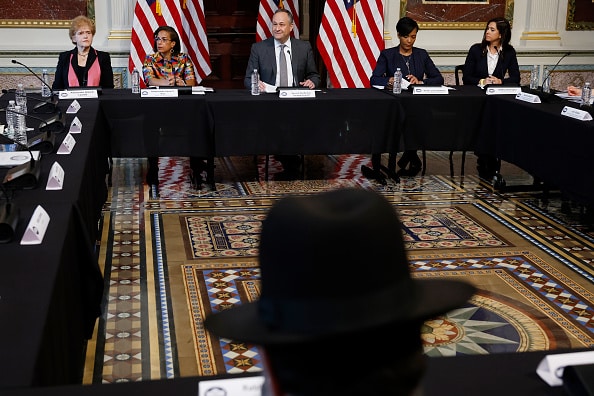
We’re curious…
Last week, a first-of-its-kind meeting was held at the White House — Second Gentleman Doug Emhoff hosted Jewish leaders from across the United States for a roundtable on the rise in antisemitism.
“Judaism isn’t defined by how much we go to temple or how often we celebrate traditions; it’s who we are as a people,” Emhoff said at the meeting. “It’s our identity. It’s my identity. And I’m in pain right now.”
The meeting comes after a string of high-profile antisemitic incidents, including the comments made by Kanye West (which we cover on our new YouTube channel here), Kyrie Irving, and the arrest of two men who were allegedly on their way to attack a New York City synagogue.
In the wake of the meeting, we wanted to know, just how high is antisemitism in America right now? How does what’s happening in the U.S. fit in with global trends? And how are Jewish and government leaders around the world responding?
“Epidemic of hate”
“Words matter,” Emhoff said at the meeting. “People are no longer saying the quiet parts out loud. They are literally screaming them.”
Emhoff went on to describe the rise of antisemitism in the United States as an “epidemic of hate.”
“We cannot normalize this,” he added. “As long as I have this microphone I’m going to speak out against hate, bigotry, lies. I’m going to speak out against those who praise fascist murderers and idolize extremists.”
Representatives from thirteen Jewish organizations attended the event, as well as top Biden officials such as domestic policy adviser Susan Rice and senior adviser to the president for public engagement Keisha Lance Bottoms, along with special envoy to combat antisemitism Deborah Lipstadt.
“This is a very real threat to Jews, and that alone would make it worth fighting with all our soul, with all our mind, but there are reasons to fight this violence beyond the danger it poses to the Jews. Antisemites don’t stop with hating Jews, their antisemitism is the tip of the iceberg of hate and prejudice,” Lipstadt said.
In the wake of Kanye’s antisemitic comments, President Joe Biden raised his own concerns on Twitter, calling out “political leaders” for not strongly denouncing antisemitism.
I just want to make a few things clear:
— President Biden (@POTUS) December 2, 2022
The Holocaust happened.
Hitler was a demonic figure.
And instead of giving it a platform, our political leaders should be calling out and rejecting antisemitism wherever it hides.
Silence is complicity.
“We’re at a moment in our country where the antisemitism that we’ve seen is shocking, not just to the Jewish community, but to America as a whole,” said Ted Deutch, CEO of the American Jewish Committee, who attended the meeting.
The meeting came a day after 126 lawmakers from Congress urged the Biden administration to come up with a national plan of action to deal with the uptick of antisemitism.
“As members of the House and Senate Bipartisan Task Forces for Combating Antisemitism, we write to urge you to ensure leaders working within your Administration are working together to execute a unified national strategy to monitor and combat antisemitism,” the lawmakers said in a letter.
The global rise in antisemitism
National plans to combat anti-Jewish hate are not unheard of. Just this month, Germany adopted a “National Strategy against Anti-Semitism and for Jewish Life” following an increase in antisemitism in the country.
The news comes as German officials arrested several far-right members plotting to stage a coup against the government.
Among those arrested were members of the extremist Reichsbürger (Citizens of the Reich) movement, which has been under investigation for years for violent attacks and antisemitic propaganda.
Meanwhile, members of the Jewish community in Canada are pushing for a similar government program following the discovery of antisemitic remarks made by Laith Marouf, a consultant for the Canadian government on anti-racism initiatives.
An annual audit by B’nai Brith Canada found record levels of antisemitism in the country last year, with 2,799 anti-Jewish hate crimes, some of them violent.
In the United Kingdom, a just-announced bipartisan parliamentary panel will look into accusations that the BBC unfairly covers Jews and Israel. The news comes after a historic number of reported antisemitic incidents in the U.K.
“A national priority”
“When I began my career, I thought antisemitism was an issue in my father’s generation — it won’t be in mine,” Los Angeles rabbi David Wolpe told the Associated Press last week. “I was sadly… wrong.”
In the U.S., antisemitic incidents have increased to record levels. According to data released by the New York City Police Department (NYPD), an anti-Jewish attack took place every 16 hours in the city during the month of November.
This was in Brooklyn outside Barclays yesterday. These dudes have been doing this since I can remember but now they have some famous spokespeople #kyrie #Kanye pic.twitter.com/3h8MhL9wx4
— MichaelRapaport (@MichaelRapaport) December 4, 2022
There were 45 documented antisemitic attacks in New York City in November, representing 60% of all hate crime incidents in the city (that figure is up 125% from a year ago).
On top of that, the NYPD says 195 anti-Jewish hate crimes happened between January 1st and September 30th, a number far higher than recorded for any other group.
Nationally, the numbers aren’t any better. The Anti-Defamation League recorded 2,717 antisemitic incidents across the country last year — a 34% increase from the previous year and the highest since it began tracking in 1979.
“I don’t think it’s an understatement to assert that we are reaching a point where this is becoming a national crisis,” ADL CEO Jonathan Greenblatt said.
“We have celebrities repeating antisemitic tropes. We have the former president breaking bread with bigots, including white supremacists. We have athletes normalizing Holocaust denialism.”
Response in Israel
The Israeli government actually prepared for the current rise in antisemitism last year. The budget for Diaspora Relations was doubled, highlighting the sense of urgency the government was trying to build when it came to reaching out to Jews outside of Israel.
“We anticipate a drastic rise in antisemitism, manifestations of extremism among American Jews and knowledge gaps in relation to Israel,” Diaspora Affairs Minister Nachman Shai told The Jerusalem Post in August of 2021, when the budget for his department was announced.
“All of these are a warning light that must not be ignored. We will lay out long-term infrastructure plans in Israel and in the Diaspora to correct the problems and to deal with the challenges that will arrive on our doorstep.”
Fast forward to last week, expected incoming prime minister Benjamin Netanyahu weighed in on former President Donald Trump’s decision to dine with known white supremacist Nick Fuentes and Ye, earning the former president a rare rebuke.
“Straight away, I thought that was just wrong and misplaced,” Netanyahu told Chuck Todd on NBC’s Meet the Press. “That’s what I would say about President Trump’s decision to dine with this person. I think it’s wrong and misplaced. I think it’s a mistake.”
Meanwhile, there is a growing concern in Israel for the American community.
“Unless you’re in your 90s, this hasn’t happened in your lifetime in the Western world,” Haaretz columnist Anshel Pfeffer wrote. “It’s a direct threat to American Jews and American democracy.”
Sheldon Kirshner, a journalist in Toronto, echoed this sentiment in a Times of Israel op-ed.
“Historically, explicit antisemitism, particularly its violent variety, has been cyclical in nature, waxing and waning. So it remains to be seen whether the current outbreak will be of short duration or last considerably longer. But for now, Jewish Americans have reason to be concerned by the climate of intolerance that is currently gripping the United States.”
“The golden age for Jews in America is coming to an end,” Adam Milstein, an Israeli-American venture philanthropist, wrote in the Jerusalem Post.
“While we undoubtedly face grave challenges as American Jews, we must not give up…We must collectively demand a rejection of all forms of antisemitism, including and especially anti-Zionism,” he added.
Meanwhile, others are going as far as advocating for Americans to make Aliyah.
“[T]he antisemitism in America and its rapid growth…should be a trigger for you to begin the process of coming home,” Israeli tech influencer Hillel Fuld wrote on social media last week. “It all comes down to looking at history, and not kidding yourself that history won’t repeat itself. It always does. It already is,” he added.
However, Rabbi David Wolpe told the Associated Press that he strives to put the recent events in perspective.
“We are still — in America — as safe and free as Jews have been in all of human history. It’s so easy to be alarmist… to lose perspective, to scare our kids. I don’t want to do that.”
Similarly, in his remarks at the roundtable meeting, Second Gentleman Emhoff reminded the audience of “the promise of America”:
“On days like today, I think back to Ellis Island,” he said. “I think about my family members, and I think of the promise of America. That a young boy from Brooklyn — whose family fled persecution — could be sitting here today as the first second gentleman of the United States in the White House.”


